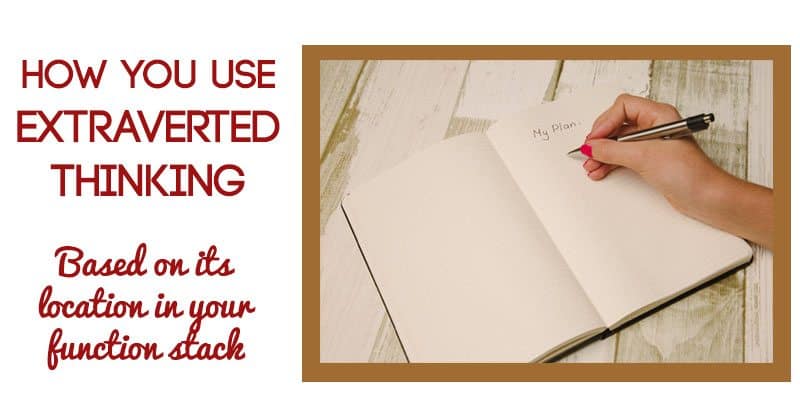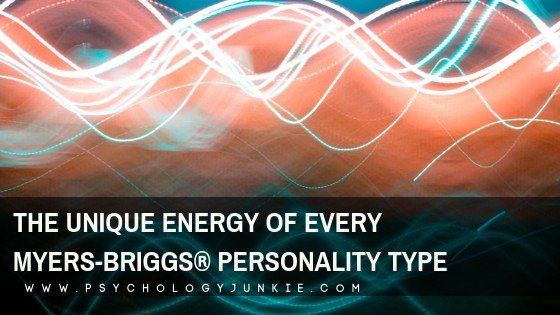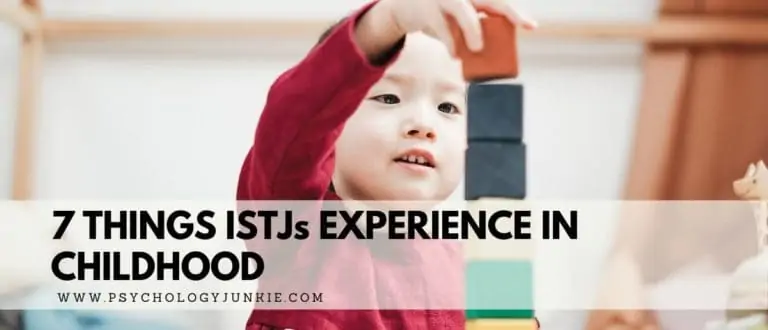How You Use Extraverted Thinking – Based On Its Location in Your Function Stack
“We can judge our progress by the courage of our questions and the depth of our answers, our willingness to embrace what is true rather than what feels good.”
– Carl Sagan, an ENTJ
Extraverted Thinking (Te) is the function that has been used by some of the most thought-provoking inventors, scientists, politicians, and businessmen the world has ever known. Te is all about maintaining objective logic and arranging the world in a precise, effective fashion. Te-users like to organize; they organize facts, rules, truths, and anything in their outer environment that needs fixing. The Te-user values, above all, truth. Te-dominant and auxiliary users are suspicious of sentiment and emotions, but trust what they can verify through facts, experimentation, and results. They know what works and what doesn’t, and they know the most effective way to meet their goals. Dominant and auxiliary Te-users are considered the most financially successful of all the 16 personality types. People like Bill Gates (ENTJ), Jack Welch (ENTJ), Warren Buffet (ISTJ), and Michelle Obama (ESTJ) are all Te-users and they all are extremely driven, logical, focused, and goal-oriented individuals.

The Neuroscience of Extraverted Thinking
UCLA professor and expert in neuroscience, Dario Nardi, says in his book Neuroscience of Personality: Brain Savvy Insights for All Types of People that Te-dominant individuals “show efficient use of mental energy as they rely on evidence-based decision-making….The Te types focus on goals and are stimulated by task completion and error correction.” Nardi also says that Te-dominant personalities are “less excited about the minutia of implementing goals and prefer to direct others to do so.” This is why Te-dominant personalities are tailor-made for the executive and political realm. They can easily spot inaccuracies, flaws, and roadblocks to achieving goals and ensure those flaws and issues are corrected. Nardi also noticed that Te-dominant types used their brain in an energy-efficient way, focusing on measurable elements and only the necessary information needed to make a decision. ESTJs and ENTJs, as a result, thrive on making decisions, and on directing and supervising. They enter a mentally stimulated “zone” state when they can continually make decisions, complete projects, and organize to complete a goal. They are hard-workers, determined, and single-minded in their approach.
“I do not know anyone who has got to the top without hard work. That is the recipe. It will not always get you to the top, but should get you pretty near.”
– Margaret Thatcher, ENTJ
Different Types Use Te Differently
An ESTJ will use Te far differently from an INFP. Many feeling types aren’t aware of how they use thinking, and so this post will (hopefully) help them to identify how they access it, and how their perspective on thinking influences their perceptions of others. Here’s a breakdown of the Te users and the position of Extraverted Thinking in their function stack:
Dominant Extraverted Thinkers:
ENTJs and ESTJs
Auxiliary Extraverted Thinkers:
INTJs and ISTJs
Tertiary Extraverted Thinkers:
ENFPs and ESFPs
Inferior Extraverted Thinkers:
INFPs and ISFPs
All of the other eight Myers-Briggs personality types have Te in their shadow functions. This is much more complex and we won’t be discussing those in this post.
How ESTJs and ENTJs Use Te:
ESTJs and ENTJs are the ultimate decision-makers. They thrive on accomplishing goals, managing teams, and making the right choices to get a job done effectively. They are objective in their decisions, casting aside emotional complexities to get down to the core facts and truth of a problem. “What are the facts? What needs to be done? What is the most efficient way to do it?” These are the questions of the ESTJ and the ENTJ. Te-dominant types despise laziness, inefficiency, complaining or mindless chatter. They are very goal-oriented and determined, believing that not a single moment should be wasted.
Isabel Briggs-Myers said of Te-dominant types, “They are in their element whenever the outer situation needs to be organized, criticized, or regulated….They abhor confusion, inefficiency, half measures, anything that is aimless or ineffective. Often they are crisp disciplinarians, who know how to be tough when the situation calls for toughness.”
According to this study ESTJs and ENTJs are the highest earners in the United States. The average yearly income for an ESTJ is $77k while the average yearly income for an ENTJ is $76K. They also managed more people at work than any of the other personality types.
ENTJs and ESTJs thrive on decision-making because their dominant function (Extraverted Thinking) is focused on completion and making decisions. They like to get things done. However, their auxiliary function, either Introverted Sensing or Introverted Intuition, is extremely important because, if they access it enough, they will balance their decisions with past experience (Sensing) or future insight (Intuition). When these types are focused on achieving a goal they can be an incredible force for progress in our world.
How ENTJs Use Te:
ENTJs are big-picture thinkers who like to focus on long-range plans and future possibilities. Like ESTJs, they will thrive on making decisions and creating efficient courses of action. However, ENTJs will balance their thinking process with intuition, which gives them a visionary angle to their focus. They get bored with the present moment and will try to think of long-term strategies and results. Using thinking and intuition, they are able to find new, innovative solutions to problems. Unlike the ESTJ, they will be less interested in dealing with details and a storehouse of facts.
ENTJs are extremely ambitious and driven; they long to achieve what has never been achieved before. They like a challenge and they are aggressive at tackling obstacles that stand in their way. Their dominance reflects in their education, as well. According to the MBTI Manual, ENTJs are one of the four types in college displaying the highest levels of assertiveness. They also are among the top four types in college GPA, and they have the highest grades among persisters in college.
ENTJs like to be surrounded by other intuitive types. They can get irritated and bored by focusing on the present or concrete details in their surroundings. They prefer to spend their time with others who are big-picture thinkers and who can quickly make sense of theoretical analysis and ideas. That said, ENTJs do well to have at least one sensing type in their group of friends (especially if they are running a business) to keep them from overlooking relevant details and facts.
ENTJs use Te to make tough decisions, to analyze problems and figure out how to solve them. They use thinking and intuition to strategize exactly what steps need to occur to reach a goal. They will think outside the box, listening more to innovative ideas than tried-and-true ideas. They will be extremely objective in their viewpoints and will make decisions based on what seems to be the most logical, efficient, and progressive course of action.
How ESTJs Use Te:
ESTJs will combine a love of logic and efficiency with a reliance on auxiliary Introverted Sensing (Si). As a result, they are going to be extremely realistic in their viewpoints, focusing on the facts, the current details, and the realities they see before them. ESTJs solve problems by applying past experience and what they know and trust to be true through personal experience. They naturally excel at business and industry, production and construction.
Where the ENTJ is stimulated by new and novel ideas, the ESTJ is stimulated by new things that appeal to the senses. They tend to have a fondness for new useful objects, gadgets, food, physical activities, and beautiful scenery. They are skilled when it comes to hands-on activities and anything that allows them to apply their thinking in some tangible, sensory way.
The ESTJ will like to think through their decisions out loud, discussing options with other sensing types. They like dealing with people who are down-to-earth and practical and they can get bored or feel distrustful of more innovative, abstract thinkers. They like to know moving forward that what they are doing has been tried and tested and can be relied on to work. This can be a great strength because it allows them to be careful and detail-oriented in all their tasks. However, it’s good for them to have an intuitive around who can open their mind to new, innovative ideas that will help them to progress and see the big picture.
ESTJs use Te to quickly make logical decisions, to stay objective, and to efficiently organize their outer world. They can be counted on to be honest, reliable, and true to their word. They will be skilled at organizing a project and making sure it gets done in a timely manner. Healthy ESTJs will hold themselves to the same high standards they expect of other people, and as a result are counted on by their friends and loved ones to be responsible, loyal, and trustworthy.
How INTJs and ISTJs Use Te:
INTJs and ISTJs will rely on Extraverted Thinking only after it filters through either Introverted Intuition (for the INTJ) or Introverted Sensing (for the ISTJ). They will pause before making decisions, considering what their insight (Ni) or past experience (Si) tells them before making a decision. They will prefer to spend more time alone processing things and carefully considering before taking action. ISTJs and INTJs are very goal-oriented, much like ESTJs and ENTJs, but they need more time to think, more space to process, and prefer to work independently rather than leading large groups of people. Autonomy is of vital importance to the ITJ personality type.
How INTJs Use Te:
INTJs are first of all intuitives, which means they try to discern patterns, symbols, and future forecasts. They look to the future and try to find out the big picture and meaning behind things. They are imaginative and fascinated by possibilities and trying to determine the most likely outcome for any given problem. They use Extraverted Thinking (Te) to organize and solve problems and understand complex theories and strategies. They like challenges, and will want to complete one challenge after the next. Routine irritates them to no end, and they will only feel fulfilled if they are able to successively solve bigger and better problems and stretch their intuitive and thinking powers.
INTJs are true academics in every sense of the word and are one of two types with the highest undergraduate GPA. They also have the highest GPA among persisters in college. According to the MBTI Manual, INTJs favorite leisure activities included “Taking classes, going to school.” “Appreciating art,” “Playing with computers or video games,” and “Working out/exercising”.
INTJs use Te to make logical, objective decisions. They view everything with a critical, unbiased eye and are able to quickly identify problems that need to be solved. They can be tough and decisive when needed and are clear and concise in their language. To outsiders, the INTJ will seem rational, detached, calm, and assured.
How ISTJs Use Te:
ISTJs are first of all sensors, which means they are focused on the concrete, practical realities of daily life. They value their past experience and the tried-and-true technique. They are known for their accuracy, reliability, concentration, and memory for details. They are incredibly attentive to what is happening around them and are quick to notice flaws that need correcting. They put a tremendous amount of faith in their own past experience, and continually draw from that when moving forward to determine how events may unfold. They use their thinking skills to excel in school, and are among the four highest types in college GPA, preferring math and practical skills.
Organization is important to ISTJs, they take pleasure in making everything orderly and systematized. They like to know where everything is and how to streamline systems to make them more effective.
ISTJs are objective and logical in their decisions, preferring to remain detached and unbiased. They have a calm, stable and steady demeanor and strive to be responsible and dependable in everything that they do. They are also down-to-earth individuals who often have a surprisingly offbeat, good-natured sense of humor.
Unlike INTJs, ISTJs like to focus on the practical realities of the present moment. They are less concerned with theory and abstract analysis and more concerned with the here and now. They like to solve the problems at hand and learn things that will benefit them or their loved ones in some tangible way. They gain much of their self-esteem through being thorough and dependable.
How ENFPs and ESFPs Use Te:
ENFPs and ESFPs will consider their decisions internally through their introverted feeling (Fi) function. They prefer to keep their judgments to themselves, thus seeming open-minded and non-judgmental. However, their tertiary thinking function gives their decisions a logical balance. ESFPs and ENFPs will develop a more conscious awareness of extraverted thinking in mid-life.
How ENFPs Experience Te:
ENFPs prefer to make decisions with feeling rather than thinking. They will try to discern which decision aligns with their values, their emotions, and internal morals. They may be more suspicious of their thinking function because it is more unconscious to them and thus more mysterious and unnatural to access. ENFPs prefer to make decisions that align with their own personal values and may struggle with deciding on the basis of cold, hard logic. That said, ENFPs will use Te to find whichever resources are necessary to make their desires a reality and as they grow and mature they will become more and more outwardly organized and objective in their decision making.
ENFPs are idea-generators who are constantly seeing the potential in the outside world. They use Te to organize their ideas, and find the right tools needed to reach a goal. It may be a struggle for them to use this function on a regular basis, but as they grow and develop it will become more conscious and mature. ENFPs will develop Extraverted Thinking (Te) in mid-life, however they will always have more conscious control over Extraverted Intuition (Ne) and Introverted Feeling (Fi).
How ESFPs Experience Te:
ESFPs prefer to make decisions internally through their introverted feeling (Fi) function. Like ENFPs, they prefer to keep their judgments internalized and will seem open-minded and adaptable. However, Extraverted Thinking (Te) gives their decisions a logical balance and a stabilizing effect. ESFPs prefer to make decisions that will maintain harmony and may be more uncomfortable remaining objective and directing others.
ESFPs are experiencers who love to engage in the world around them. They are extremely aware of what’s happening in their environment and know how to react quickly and adapt readily. They use Te to respond to outer stimuli in a practical and logical way. They have a desire to be responsible and “do things by the book” because tertiary Te combined with Sensing is focused on following external rules.
ESFPs usually develop more conscious control of Te during their thirties and forties and will find freedom in being able to more logically assess situations and reach their desired outcome efficiently.
How INFPs and ISFPs Use Te:
How INFPs Use Te:
INFPs are somewhat distrusting of Extraverted Thinking in their own lives. Because it is their inferior function it is the most unconscious of their primary functions and the hardest to control or access. Because of this, INFPs will try to suppress Te and rely as much as possible on Introverted Feeling (Fi) and Extraverted Intuition (Ne). As a result, they will focus on their values, morals, and internal emotions when making decisions and will struggle with remaining objective or focusing on just the facts involved. That said, Te will have an influence in their lives. They will experience it as an urge to find ways to put their dreams into action or to create plans for their goals. They may feel self-conscious and hyper-aware of their positions on things, analyzing them to double-check that there aren’t logical errors.
INFPs will use Te in conjunction with Fi to draw conclusions about their external circumstances. They will be especially aware of injustice and unfairness and will want to correct this using their feeling, values and their vision and eye for possibilities.
When INFPs overuse Fi and Ne too much, especially under stress, they may tire out those functions and eventually fall “into the grip” of Extraverted Thinking. When this happens, they will become uncharacteristically critical of others, obsessed with fixing perceived problems, and cynical or sarcastic. They will behave more like unhealthy ESTJs than healthy INFPs. They can find ways out of this grip state by following some of the steps in this article 12 Stress-Busting Techniques for INFPs.
As INFPs reach their 50s and 60s they develop more conscious control of Extraverted Thinking and may become more balanced overall. They may be able to remain objective longer and come up with efficient ways of putting their plans into action.
How ISFPs Use Te:
ISFPs experience Te in a very similar way to INFPs. They prefer to focus on their values, emotions, and beliefs when making decisions and may struggle to remain objective or logic-driven. They will distrust their Te because it is the least conscious of their primary functions and the least accessible. They will experience it more as “background noise” that gets in the way of their dominant and auxiliary functions. Under stress, ISFPs may overuse feeling and sensing and as a result, fall into the grip of their inferior thinking function. When this happens, they can become uncharacteristically critical, focused on organizing and fixing problems, and righting wrongs.
ISFPs will use Te to draw conclusions about their external circumstances and their feeling will provide a subjective response to those thinking judgments. This allows them to see potential injustices and notice situations that are unfair. They will also use Te to follow external rules and be responsible. Because Te is so unconscious for the ISFP they may struggle with speaking their mind, forming judgments, and asserting their position. They are more likely to address situations through action (sensing) than through trying to organize other people or direct them.
ISFPs will develop Te in their 50s and 60s and will enjoy a healthier balance of all their functions.
What Are Your Thoughts?
How have you experienced Extraverted Thinking in your life? Share with me and others in the comments!
Find out more about your personality type in our eBooks, Discovering You: Unlocking the Power of Personality Type or The INFJ – Understanding the Mystic. You can also connect with me via Facebook, Instagram, or Twitter!
Want a complete course on your personality type? Personality Hacker has training and courses for each personality type, complete with webinars, a 14-page course, audio advice sessions and more here.
Sources:
Gifts Differing: Understanding Personality Type
MBTI Manual: A Guide to the Development and Use of the Myers-Briggs Type Indicator, 3rd Edition
My True Type: Clarifying Your Personality Type, Preferences & Functions
Neuroscience of Personality: Brain Savvy Insights for All Types of People















Ok, now, did you think of me when you wrote the ESTJ part? ha ha This was insightful, as always, and makes me feel better about myself than I should, perhaps! Thanks again for a helpful post, Suz.
The description of ENFPs says “Rather than be objective, ENFPs prefer to use Te to make decisions that maintain harmony…”
Extroverted feeling is concerned with maintaining harmony. ENFPs use introverted feeling, which processes things according to their perceived value, constructing an internalised moral code independent of social norms.
ENFPs use Te to gather factual information about their theoretical explorations (Ne). This information is processed through a lense of introverted feeling, which is not impartial, but makes value judgements based on individual human welfare.
Wow, this is definitely a typo. Will be going back and fixing this, thank you for catching that!
Hey, Susan. I think you need to clean up your website, because my anti-virus protection is going crazy every time I click on a new article. “Threat has been detected. We have aborted contact with (insert weird name here).com because it was infected with malware” or something along those lines pops up multiple times.
Thank you Morgan!! After seeing your comment I ran some scans on my site to see if there was anything wrong. I didn’t find malware, but there were a bunch of links that got messed up in the process of my changing hosts several weeks ago. As a result they weren’t directing to https (which is more secure) but to http. Thank you for bringing this to my attention!! I was able to fix some problems I wouldn’t have been aware of if you hadn’t!
I don’t know, I find your article very discouraging, especially because you often focus more on the negative sides of your conclusions, than the positive ones, this is not a guide I’d recomment.